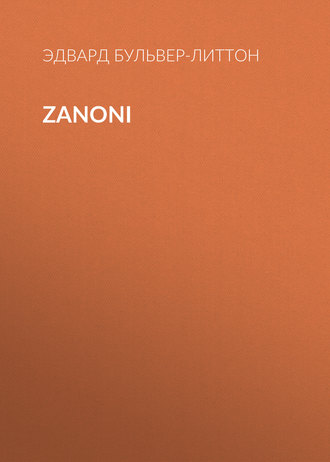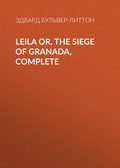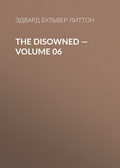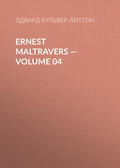
Эдвард Бульвер-Литтон
Zanoni
BOOK V. – THE EFFECTS OF THE ELIXIR
CHAPTER 5.I
Frommet’s den Schleier aufzuheben,
Wo das nahe Schreckness droht?
Nur das Irrthum ist das Leben
Und das Wissen ist der Tod,
—Schiller, Kassandro.
Delusion is the life we live
And knowledge death; oh wherefore, then,
To sight the coming evils give
And lift the veil of Fate to Man?
Zwei Seelen wohnen, ach! in meiner Brust.
(Two souls dwell, alas! in my breast.)
....
Was stehst du so, und blickst erstaunt hinaus?
(Why standest thou so, and lookest out astonished?)
—“Faust.”
It will be remembered that we left Master Paolo by the bedside of Glyndon; and as, waking from that profound slumber, the recollections of the past night came horribly back to his mind, the Englishman uttered a cry, and covered his face with his hands.
“Good morrow, Excellency!” said Paolo, gayly. “Corpo di Bacco, you have slept soundly!”
The sound of this man’s voice, so lusty, ringing, and healthful, served to scatter before it the phantasma that yet haunted Glyndon’s memory.
He rose erect in his bed. “And where did you find me? Why are you here?”
“Where did I find you!” repeated Paolo, in surprise,—“in your bed, to be sure. Why am I here!—because the Padrone bade me await your waking, and attend your commands.”
“The Padrone, Mejnour!—is he arrived?”
“Arrived and departed, signor. He has left this letter for you.”
“Give it me, and wait without till I am dressed.”
“At your service. I have bespoke an excellent breakfast: you must be hungry. I am a very tolerable cook; a monk’s son ought to be! You will be startled at my genius in the dressing of fish. My singing, I trust, will not disturb you. I always sing while I prepare a salad; it harmonises the ingredients.” And slinging his carbine over his shoulder, Paolo sauntered from the room, and closed the door.
Glyndon was already deep in the contents of the following letter:—
“When I first received thee as my pupil, I promised Zanoni, if convinced by thy first trials that thou couldst but swell, not the number of our order, but the list of the victims who have aspired to it in vain, I would not rear thee to thine own wretchedness and doom,—I would dismiss thee back to the world. I fulfil my promise. Thine ordeal has been the easiest that neophyte ever knew. I asked for nothing but abstinence from the sensual, and a brief experiment of thy patience and thy faith. Go back to thine own world; thou hast no nature to aspire to ours!
“It was I who prepared Paolo to receive thee at the revel. It was I who instigated the old beggar to ask thee for alms. It was I who left open the book that thou couldst not read without violating my command. Well, thou hast seen what awaits thee at the threshold of knowledge. Thou hast confronted the first foe that menaces him whom the senses yet grasp and inthrall. Dost thou wonder that I close upon thee the gates forever? Dost thou not comprehend, at last, that it needs a soul tempered and purified and raised, not by external spells, but by its own sublimity and valour, to pass the threshold and disdain the foe? Wretch! all my silence avails nothing for the rash, for the sensual,—for him who desires our secrets but to pollute them to gross enjoyments and selfish vice. How have the imposters and sorcerers of the earlier times perished by their very attempt to penetrate the mysteries that should purify, and not deprave! They have boasted of the Philosopher’s Stone, and died in rags; of the immortal elixir, and sunk to their grave, grey before their time. Legends tell you that the fiend rent them into fragments. Yes; the fiend of their own unholy desires and criminal designs! What they coveted, thou covetest; and if thou hadst the wings of a seraph thou couldst soar not from the slough of thy mortality. Thy desire for knowledge, but petulant presumption; thy thirst for happiness, but the diseased longing for the unclean and muddied waters of corporeal pleasure; thy very love, which usually elevates even the mean, a passion that calculates treason amidst the first glow of lust. THOU one of us; thou a brother of the August Order; thou an Aspirant to the Stars that shine in the Shemaia of the Chaldean lore! The eagle can raise but the eaglet to the sun. I abandon thee to thy twilight!
“But, alas for thee, disobedient and profane! thou hast inhaled the elixir; thou hast attracted to thy presence a ghastly and remorseless foe. Thou thyself must exorcise the phantom thou hast raised. Thou must return to the world; but not without punishment and strong effort canst thou regain the calm and the joy of the life thou hast left behind. This, for thy comfort, will I tell thee: he who has drawn into his frame even so little of the volatile and vital energy of the aerial juices as thyself, has awakened faculties that cannot sleep,—faculties that may yet, with patient humility, with sound faith, and the courage that is not of the body like thine, but of the resolute and virtuous mind, attain, if not to the knowledge that reigns above, to high achievement in the career of men. Thou wilt find the restless influence in all that thou wouldst undertake. Thy heart, amidst vulgar joys will aspire to something holier; thy ambition, amidst coarse excitement, to something beyond thy reach. But deem not that this of itself will suffice for glory. Equally may the craving lead thee to shame and guilt. It is but an imperfect and new-born energy which will not suffer thee to repose. As thou directest it, must thou believe it to be the emanation of thine evil genius or thy good.
“But woe to thee! insect meshed in the web in which thou hast entangled limbs and wings! Thou hast not only inhaled the elixir, thou hast conjured the spectre; of all the tribes of the space, no foe is so malignant to man,—and thou hast lifted the veil from thy gaze. I cannot restore to thee the happy dimness of thy vision. Know, at least, that all of us—the highest and the wisest—who have, in sober truth, passed beyond the threshold, have had, as our first fearful task, to master and subdue its grisly and appalling guardian. Know that thou CANST deliver thyself from those livid eyes,—know that, while they haunt, they cannot harm, if thou resistest the thoughts to which they tempt, and the horror they engender. DREAD THEM MOST WHEN THOU BEHOLDEST THEM NOT. And thus, son of the worm, we part! All that I can tell thee to encourage, yet to warn and to guide, I have told thee in these lines. Not from me, from thyself has come the gloomy trial from which I yet trust thou wilt emerge into peace. Type of the knowledge that I serve, I withhold no lesson from the pure aspirant; I am a dark enigma to the general seeker. As man’s only indestructible possession is his memory, so it is not in mine art to crumble into matter the immaterial thoughts that have sprung up within thy breast. The tyro might shatter this castle to the dust, and topple down the mountain to the plain. The master has no power to say, ‘Exist no more,’ to one THOUGHT that his knowledge has inspired. Thou mayst change the thoughts into new forms; thou mayst rarefy and sublimate it into a finer spirit,—but thou canst not annihilate that which has no home but in the memory, no substance but the idea. EVERY THOUGHT IS A SOUL! Vainly, therefore, would I or thou undo the past, or restore to thee the gay blindness of thy youth. Thou must endure the influence of the elixir thou hast inhaled; thou must wrestle with the spectre thou hast invoked!”
The letter fell from Glyndon’s hand. A sort of stupor succeeded to the various emotions which had chased each other in the perusal,—a stupor resembling that which follows the sudden destruction of any ardent and long-nursed hope in the human heart, whether it be of love, of avarice, of ambition. The loftier world for which he had so thirsted, sacrificed, and toiled, was closed upon him “forever,” and by his own faults of rashness and presumption. But Glyndon’s was not of that nature which submits long to condemn itself. His indignation began to kindle against Mejnour, who owned he had tempted, and who now abandoned him,—abandoned him to the presence of a spectre. The mystic’s reproaches stung rather than humbled him. What crime had he committed to deserve language so harsh and disdainful? Was it so deep a debasement to feel pleasure in the smile and the eyes of Fillide? Had not Zanoni himself confessed love for Viola; had he not fled with her as his companion? Glyndon never paused to consider if there are no distinctions between one kind of love and another. Where, too, was the great offence of yielding to a temptation which only existed for the brave? Had not the mystic volume which Mejnour had purposely left open, bid him but “Beware of fear”? Was not, then, every wilful provocative held out to the strongest influences of the human mind, in the prohibition to enter the chamber, in the possession of the key which excited his curiosity, in the volume which seemed to dictate the mode by which the curiosity was to be gratified? As rapidly these thoughts passed over him, he began to consider the whole conduct of Mejnour either as a perfidious design to entrap him to his own misery, or as the trick of an imposter, who knew that he could not realise the great professions he had made. On glancing again over the more mysterious threats and warnings in Mejnour’s letter, they seemed to assume the language of mere parable and allegory,—the jargon of the Platonists and Pythagoreans. By little and little, he began to consider that the very spectra he had seen—even that one phantom so horrid in its aspect—were but the delusions which Mejnour’s science had enable him to raise. The healthful sunlight, filling up every cranny in his chamber, seemed to laugh away the terrors of the past night. His pride and his resentment nerved his habitual courage; and when, having hastily dressed himself, he rejoined Paolo, it was with a flushed cheek and a haughty step.
“So, Paolo,” said he, “the Padrone, as you call him, told you to expect and welcome me at your village feast?”
“He did so by a message from a wretched old cripple. This surprised me at the time, for I thought he was far distant; but these great philosophers make a joke of two or three hundred leagues.”
“Why did you not tell me you had heard from Mejnour?”
“Because the old cripple forbade me.”
“Did you not see the man afterwards during the dance?”
“No, Excellency.”
“Humph!”
“Allow me to serve you,” said Paolo, piling Glyndon’s plate, and then filling his glass. “I wish, signor, now the Padrone is gone,—not,” added Paolo, as he cast rather a frightened and suspicious glance round the room, “that I mean to say anything disrespectful of him,—I wish, I say, now that he is gone, that you would take pity on yourself, and ask your own heart what your youth was meant for? Not to bury yourself alive in these old ruins, and endanger body and soul by studies which I am sure no saint could approve of.”
“Are the saints so partial, then, to your own occupations, Master Paolo?”
“Why,” answered the bandit, a little confused, “a gentleman with plenty of pistoles in his purse need not, of necessity, make it his profession to take away the pistoles of other people! It is a different thing for us poor rogues. After all, too, I always devote a tithe of my gains to the Virgin; and I share the rest charitably with the poor. But eat, drink, enjoy yourself; be absolved by your confessor for any little peccadilloes and don’t run too long scores at a time,—that’s my advice. Your health, Excellency! Pshaw, signor, fasting, except on the days prescribed to a good Catholic, only engenders phantoms.”
“Phantoms!”
“Yes; the devil always tempts the empty stomach. To covet, to hate, to thieve, to rob, and to murder,—these are the natural desires of a man who is famishing. With a full belly, signor, we are at peace with all the world. That’s right; you like the partridge! Cospetto! when I myself have passed two or three days in the mountains, with nothing from sunset to sunrise but a black crust and an onion, I grow as fierce as a wolf. That’s not the worst, too. In these times I see little imps dancing before me. Oh, yes; fasting is as full of spectres as a field of battle.”
Glyndon thought there was some sound philosophy in the reasoning of his companion; and certainly the more he ate and drank, the more the recollection of the past night and of Mejnour’s desertion faded from his mind. The casement was open, the breeze blew, the sun shone,—all Nature was merry; and merry as Nature herself grew Maestro Paolo. He talked of adventures, of travel, of women, with a hearty gusto that had its infection. But Glyndon listened yet more complacently when Paolo turned with an arch smile to praises of the eye, the teeth, the ankles, and the shape of the handsome Fillide.
This man, indeed, seemed the very personation of animal sensual life. He would have been to Faust a more dangerous tempter than Mephistopheles. There was no sneer on HIS lip at the pleasures which animated his voice. To one awaking to a sense of the vanities in knowledge, this reckless ignorant joyousness of temper was a worse corrupter than all the icy mockeries of a learned Fiend. But when Paolo took his leave, with a promise to return the next day, the mind of the Englishman again settled back to a graver and more thoughtful mood. The elixir seemed, in truth, to have left the refining effects Mejnour had ascribed to it. As Glyndon paced to and fro the solitary corridor, or, pausing, gazed upon the extended and glorious scenery that stretched below, high thoughts of enterprise and ambition—bright visions of glory—passed in rapid succession through his soul.
“Mejnour denies me his science. Well,” said the painter, proudly, “he has not robbed me of my art.”
What! Clarence Glyndon, dost thou return to that from which thy career commenced? Was Zanoni right after all?
He found himself in the chamber of the mystic; not a vessel,—not an herb! the solemn volume is vanished,—the elixir shall sparkle for him no more! But still in the room itself seems to linger the atmosphere of a charm. Faster and fiercer it burns within thee, the desire to achieve, to create! Thou longest for a life beyond the sensual!—but the life that is permitted to all genius,—that which breathes through the immortal work, and endures in the imperishable name.
Where are the implements for thine art? Tush!—when did the true workman ever fail to find his tools? Thou art again in thine own chamber,—the white wall thy canvas, a fragment of charcoal for thy pencil. They suffice, at least, to give outline to the conception that may otherwise vanish with the morrow.
The idea that thus excited the imagination of the artist was unquestionably noble and august. It was derived from that Egyptian ceremonial which Diodorus has recorded,—the Judgment of the Dead by the Living (Diod., lib. i.): when the corpse, duly embalmed, is placed by the margin of the Acherusian Lake; and before it may be consigned to the bark which is to bear it across the waters to its final resting-place, it is permitted to the appointed judges to hear all accusations of the past life of the deceased, and, if proved, to deprive the corpse of the rites of sepulture.
Unconsciously to himself, it was Mejnour’s description of this custom, which he had illustrated by several anecdotes not to be found in books, that now suggested the design to the artist, and gave it reality and force. He supposed a powerful and guilty king whom in life scarce a whisper had dared to arraign, but against whom, now the breath was gone, came the slave from his fetters, the mutilated victim from his dungeon, livid and squalid as if dead themselves, invoking with parched lips the justice that outlives the grave.
Strange fervour this, O artist! breaking suddenly forth from the mists and darkness which the occult science had spread so long over thy fancies,—strange that the reaction of the night’s terror and the day’s disappointment should be back to thine holy art! Oh, how freely goes the bold hand over the large outline! How, despite those rude materials, speaks forth no more the pupil, but the master! Fresh yet from the glorious elixir, how thou givest to thy creatures the finer life denied to thyself!—some power not thine own writes the grand symbols on the wall. Behind rises the mighty sepulchre, on the building of which repose to the dead the lives of thousands had been consumed. There sit in a semicircle the solemn judges. Black and sluggish flows the lake. There lies the mummied and royal dead. Dost thou quail at the frown on his lifelike brow? Ha!—bravely done, O artist!—up rise the haggard forms!—pale speak the ghastly faces! Shall not Humanity after death avenge itself on Power? Thy conception, Clarence Glyndon, is a sublime truth; thy design promises renown to genius. Better this magic than the charms of the volume and the vessel. Hour after hour has gone; thou hast lighted the lamp; night sees thee yet at thy labour. Merciful Heaven! what chills the atmosphere; why does the lamp grow wan; why does thy hair bristle? There!—there!—there! at the casement! It gazes on thee, the dark, mantled, loathsome thing! There, with their devilish mockery and hateful craft, glare on thee those horrid eyes!
He stood and gazed,—it was no delusion. It spoke not, moved not, till, unable to bear longer that steady and burning look, he covered his face with his hands. With a start, with a thrill, he removed them; he felt the nearer presence of the nameless. There it cowered on the floor beside his design; and lo! the figures seemed to start from the wall! Those pale accusing figures, the shapes he himself had raised, frowned at him, and gibbered. With a violent effort that convulsed his whole being, and bathed his body in the sweat of agony, the young man mastered his horror. He strode towards the phantom; he endured its eyes; he accosted it with a steady voice; he demanded its purpose and defied its power.
And then, as a wind from a charnel, was heard its voice. What it said, what revealed, it is forbidden the lips to repeat, the hand to record. Nothing save the subtle life that yet animated the frame to which the inhalations of the elixir had given vigour and energy beyond the strength of the strongest, could have survived that awful hour. Better to wake in the catacombs and see the buried rise from their cerements, and hear the ghouls, in their horrid orgies, amongst the festering ghastliness of corruption, than to front those features when the veil was lifted, and listen to that whispered voice!
....
The next day Glyndon fled from the ruined castle. With what hopes of starry light had he crossed the threshold; with what memories to shudder evermore at the darkness did he look back at the frown of its time-worn towers!
CHAPTER 5.II
Faust: Wohin soll es nun gehm?
Mephist: Wohin es Dir gefallt.
Wir sehn die kleine, dann die grosse Welt.
“Faust.”
(Faust: Whither go now!
Mephist: Whither it pleases thee.
We see the small world, then the great.)
Draw your chair to the fireside, brush clean the hearth, and trim the lights. Oh, home of sleekness, order, substance, comfort! Oh, excellent thing art thou, Matter of Fact!
It is some time after the date of the last chapter. Here we are, not in moonlit islands or mouldering castles, but in a room twenty-six feet by twenty-two,—well carpeted, well cushioned, solid arm-chairs and eight such bad pictures, in such fine frames, upon the walls! Thomas Mervale, Esq., merchant, of London, you are an enviable dog!
It was the easiest thing in the world for Mervale, on returning from his Continental episode of life, to settle down to his desk,—his heart had been always there. The death of his father gave him, as a birthright, a high position in a respectable though second-rate firm. To make this establishment first-rate was an honourable ambition,—it was his! He had lately married, not entirely for money,—no! he was worldly rather than mercenary. He had no romantic ideas of love; but he was too sensible a man not to know that a wife should be a companion,—not merely a speculation. He did not care for beauty and genius, but he liked health and good temper, and a certain proportion of useful understanding. He chose a wife from his reason, not his heart, and a very good choice he made. Mrs. Mervale was an excellent young woman,—bustling, managing, economical, but affectionate and good. She had a will of her own, but was no shrew. She had a great notion of the rights of a wife, and a strong perception of the qualities that insure comfort. She would never have forgiven her husband, had she found him guilty of the most passing fancy for another; but, in return, she had the most admirable sense of propriety herself. She held in abhorrence all levity, all flirtation, all coquetry,—small vices which often ruin domestic happiness, but which a giddy nature incurs without consideration. But she did not think it right to love a husband over much. She left a surplus of affection, for all her relations, all her friends, some of her acquaintances, and the possibility of a second marriage, should any accident happen to Mr. M. She kept a good table, for it suited their station; and her temper was considered even, though firm; but she could say a sharp thing or two, if Mr. Mervale was not punctual to a moment. She was very particular that he should change his shoes on coming home,—the carpets were new and expensive. She was not sulky, nor passionate,—Heaven bless her for that!—but when displeased she showed it, administered a dignified rebuke, alluded to her own virtues, to her uncle who was an admiral, and to the thirty thousand pounds which she had brought to the object of her choice. But as Mr. Mervale was a good-humoured man, owned his faults, and subscribed to her excellence, the displeasure was soon over.
Every household has its little disagreements, none fewer than that of Mr. and Mrs. Mervale. Mrs. Mervale, without being improperly fond of dress, paid due attention to it. She was never seen out of her chamber with papers in her hair, nor in that worst of dis-illusions,—a morning wrapper. At half-past eight every morning Mrs. Mervale was dressed for the day,—that is, till she re-dressed for dinner,—her stays well laced, her cap prim, her gowns, winter and summer, of a thick, handsome silk. Ladies at that time wore very short waists; so did Mrs. Mervale. Her morning ornaments were a thick, gold chain, to which was suspended a gold watch,—none of those fragile dwarfs of mechanism that look so pretty and go so ill, but a handsome repeater which chronicled Father Time to a moment; also a mosaic brooch; also a miniature of her uncle, the admiral, set in a bracelet. For the evening she had two handsome sets,—necklace, earrings, and bracelets complete,—one of amethysts, the other topazes. With these, her costume for the most part was a gold-coloured satin and a turban, in which last her picture had been taken. Mrs. Mervale had an aquiline nose, good teeth, fair hair, and light eyelashes, rather a high complexion, what is generally called a fine bust; full cheeks; large useful feet made for walking; large, white hands with filbert nails, on which not a speck of dust had, even in childhood, ever been known to a light. She looked a little older than she really was; but that might arise from a certain air of dignity and the aforesaid aquiline nose. She generally wore short mittens. She never read any poetry but Goldsmith’s and Cowper’s. She was not amused by novels, though she had no prejudice against them. She liked a play and a pantomime, with a slight supper afterwards. She did not like concerts nor operas. At the beginning of the winter she selected some book to read, and some piece of work to commence. The two lasted her till the spring, when, though she continued to work, she left off reading. Her favourite study was history, which she read through the medium of Dr. Goldsmith. Her favourite author in the belles lettres was, of course, Dr. Johnson. A worthier woman, or one more respected, was not to be found, except in an epitaph!
It was an autumn night. Mr. and Mrs. Mervale, lately returned from an excursion to Weymouth, are in the drawing-room,—“the dame sat on this side, the man sat on that.”
“Yes, I assure you, my dear, that Glyndon, with all his eccentricities, was a very engaging, amiable fellow. You would certainly have liked him,—all the women did.”
“My dear Thomas, you will forgive the remark,—but that expression of yours, ‘all the WOMEN‘—”
“I beg your pardon,—you are right. I meant to say that he was a general favourite with your charming sex.”
“I understand,—rather a frivolous character.”
“Frivolous! no, not exactly; a little unsteady,—very odd, but certainly not frivolous; presumptuous and headstrong in character, but modest and shy in his manners, rather too much so,—just what you like. However, to return; I am seriously uneasy at the accounts I have heard of him to-day. He has been living, it seems, a very strange and irregular life, travelling from place to place, and must have spent already a great deal of money.”
“Apropos of money,” said Mrs. Mervale; “I fear we must change our butcher; he is certainly in league with the cook.”
“That is a pity; his beef is remarkably fine. These London servants are as bad as the Carbonari. But, as I was saying, poor Glyndon—”
Here a knock was heard at the door. “Bless me,” said Mrs. Mervale, “it is past ten! Who can that possibly be?”
“Perhaps your uncle, the admiral,” said the husband, with a slight peevishness in his accent. “He generally favours us about this hour.”
“I hope, my love, that none of my relations are unwelcome visitors at your house. The admiral is a most entertaining man, and his fortune is entirely at his own disposal.”
“No one I respect more,” said Mr. Mervale, with emphasis.
The servant threw open the door, and announced Mr. Glyndon.
“Mr. Glyndon!—what an extraordinary—” exclaimed Mrs. Mervale; but before she could conclude the sentence, Glyndon was in the room.
The two friends greeted each other with all the warmth of early recollection and long absence. An appropriate and proud presentation to Mrs. Mervale ensued; and Mrs. Mervale, with a dignified smile, and a furtive glance at his boots, bade her husband’s friend welcome to England.
Glyndon was greatly altered since Mervale had seen him last. Though less than two years had elapsed since then, his fair complexion was more bronzed and manly. Deep lines of care, or thought, or dissipation, had replaced the smooth contour of happy youth. To a manner once gentle and polished had succeeded a certain recklessness of mien, tone, and bearing, which bespoke the habits of a society that cared little for the calm decorums of conventional ease. Still a kind of wild nobleness, not before apparent in him, characterised his aspect, and gave something of dignity to the freedom of his language and gestures.
“So, then, you are settled, Mervale,—I need not ask you if you are happy. Worth, sense, wealth, character, and so fair a companion deserve happiness, and command it.”
“Would you like some tea, Mr. Glyndon?” asked Mrs. Mervale, kindly.
“Thank you,—no. I propose a more convivial stimulus to my old friend. Wine, Mervale,—wine, eh!—or a bowl of old English punch. Your wife will excuse us,—we will make a night of it!”
Mrs. Mervale drew back her chair, and tried not to look aghast. Glyndon did not give his friend time to reply.
“So at last I am in England,” he said, looking round the room, with a slight sneer on his lips; “surely this sober air must have its influence; surely here I shall be like the rest.”
“Have you been ill, Glyndon?”
“Ill, yes. Humph! you have a fine house. Does it contain a spare room for a solitary wanderer?”
Mr. Mervale glanced at his wife, and his wife looked steadily on the carpet. “Modest and shy in his manners—rather too much so!” Mrs. Mervale was in the seventh heaven of indignation and amaze!
“My dear?” said Mr. Mervale at last, meekly and interogatingly.
“My dear!” returned Mrs. Mervale, innocently and sourly.
“We can make up a room for my old friend, Sarah?”
The old friend had sunk back on his chair, and, gazing intently on the fire, with his feet at ease upon the fender, seemed to have forgotten his question.
Mrs. Mervale bit her lips, looked thoughtful, and at last coldly replied, “Certainly, Mr. Mervale; your friends do right to make themselves at home.”
With that she lighted a candle, and moved majestically from the room. When she returned, the two friends had vanished into Mr. Mervale’s study.
Twelve o’clock struck,—one o’clock, two! Thrice had Mrs. Mervale sent into the room to know,—first, if they wanted anything; secondly, if Mr. Glyndon slept on a mattress or feather-bed; thirdly, to inquire if Mr. Glyndon’s trunk, which he had brought with him, should be unpacked. And to the answer to all these questions was added, in a loud voice from the visitor,—a voice that pierced from the kitchen to the attic,—“Another bowl! stronger, if you please, and be quick with it!”
At last Mr. Mervale appeared in the conjugal chamber, not penitent, nor apologetic,—no, not a bit of it. His eyes twinkled, his cheek flushed, his feet reeled; he sang,—Mr. Thomas Mervale positively sang!
“Mr. Mervale! is it possible, sir—”
“‘Old King Cole was a merry old soul—‘”
“Mr. Mervale! sir!—leave me alone, sir!”
“‘And a merry old soul was he—‘”
“What an example to the servants!”
“‘And he called for his pipe, and he called for his bowl—‘”
“If you don’t behave yourself, sir, I shall call—”
“‘Call for his fiddlers three!’”







